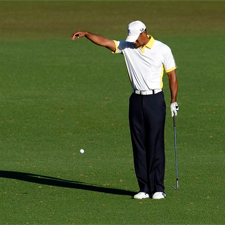Now that the events that transpired at the 2013 Masters Tournament have had a chance to settle in I feel a bit more comfortable offering some of my thoughts on what occurred and what it might mean for the future of the rules that govern the game. For sake of time and brevity I am going to assume that you know what happened on the 15th hole at Augusta Friday afternoon involving Tiger Woods, the flagstick, an improper drop, a phone call, a review of the incident by the committee, etc., etc., etc. If this is news to you, I have no idea why you are still reading!
Since April 13th I have had the opportunity to discuss this situation with numerous people – some who are rules experts and others who approach the rules a bit more casually. I have opened several rules seminars by asking folks what they thought of what happened and what, if any, rules of golf have been changed to explain why Tiger Woods was not disqualified. I am pleased to report that based on my small sampling the following consensus has emerged:
> The Rules of Golf have not changed. There was much discussion as this story unfolded that suggested that there is a new rule that allows a committee to waive the penalty of disqualification if a player should sign an incorrect scorecard. Based on what I have heard, those who formed this conclusion appear to be in the minority. For further reading on this subject, I refer you to this article (Click Here) which ran on our website two years ago when the “High Definition replay Decision” was introduced.
> The committee made a mistake. Most people feel that the committee should have discussed the drop with Tiger before he left the scoring area after his second round. (Of course, everyone who feels this way has had the benefit of 20-20 hindsight.)
> Tiger missed a tremendous public relations opportunity. Most everyone agrees that Tiger could have gone a long way toward repairing his public image by taking responsibility for his mistake and reminding everyone (young people particularly) that golf is different from other sports and that golfers are responsible for knowing and applying the rules. Most also agree that to expect an athlete in today’s world to do this is about as realistic as hoping for the return of the hickory shaft!
> Sporting events should not be influenced by someone sitting in a Lazy Boy! A lot of folks are most troubled by the fact that it was a phone call from a television viewer (once again) that set off this whole debacle. It should be noted that the rules experts I spoke with are generally less bothered by this than the more casual golf fan who find this as absurd as someone throwing a flag for holding in his living room while watching Monday Night Football. Those who have studied the rules have a greater appreciation for how golf differs from other “whistle blowing” sports where every ruling is “instantaneously final” (although less and less so with instant replay). Golf, unlike these sports is contested over multiple days without the universal oversight of referees or umpires which opens up this (I think we can all agree on this term) “can of worms.”
So, what does this all mean for the future of golf? That remains to be seen. But one thing is for sure – we have come a long way since Bobby Jones called a one-stroke penalty on himself which cost him the 1925 U.S. Open. Are we in a better place?


